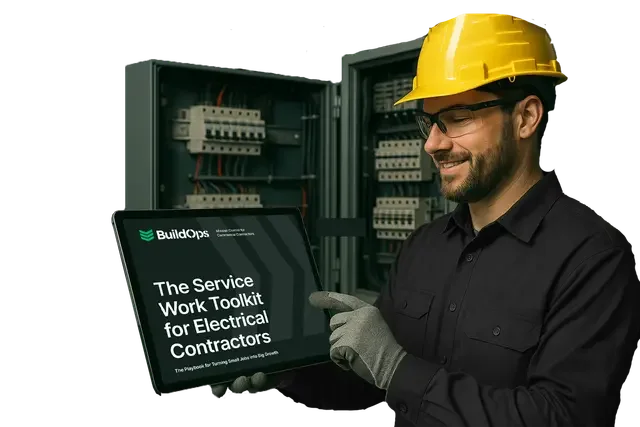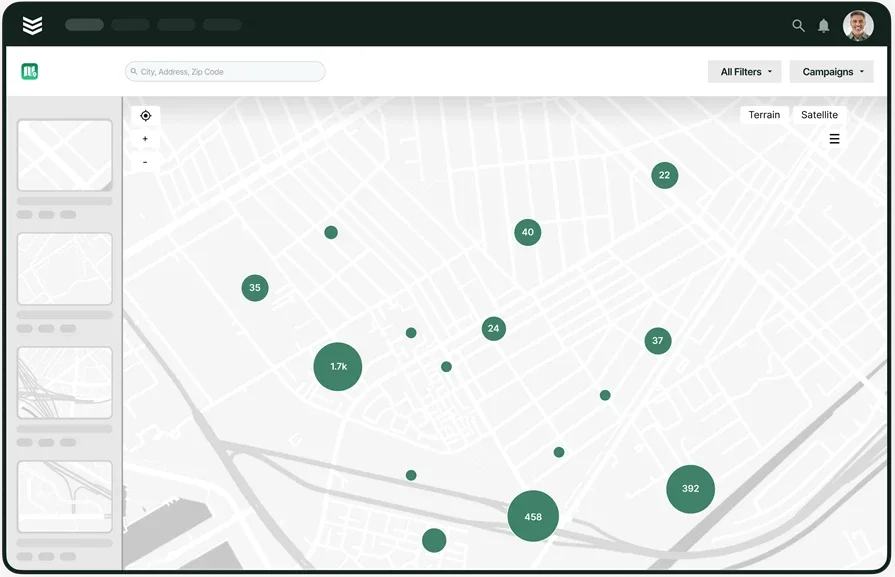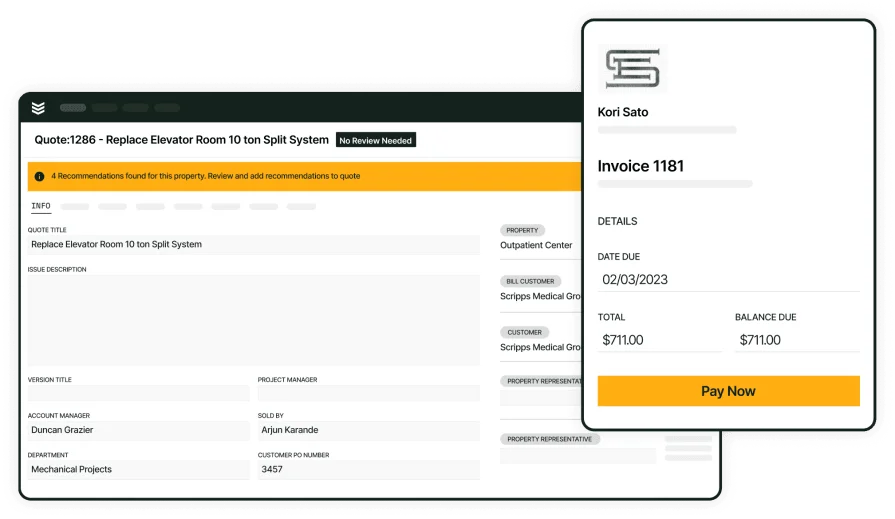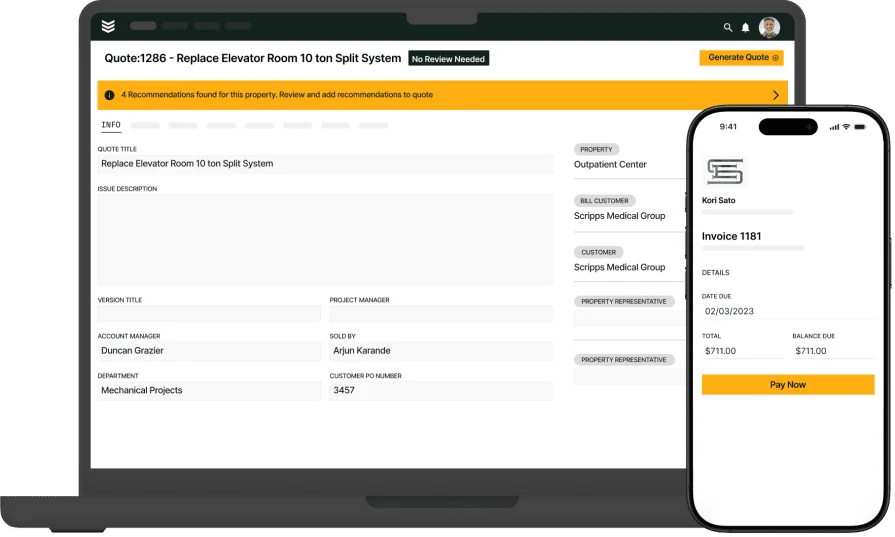Getting your numbers in front of a client is only one part of bidding electrical work. Whether it’s a service call, a full system installation, or a tenant improvement project, your bid has to show more than price—it needs to reflect your crew’s experience, the project scope, and the value you bring to the table. A clear, professional bid builds trust and puts you in a better position to win the work. This guide breaks down exactly how to approach electrical bidding—step by step, strategy by strategy—so you can walk into every opportunity with confidence.
If you're in the electrical industry, this guide is built to help you tighten up your proposals, focus your efforts, and land the jobs that actually move the needle. Here’s what we’ll walk through:
- 5 steps in the electrical bidding process
- How to bid on electrical work: 5 strategies to win more jobs
- Commercial vs residential vs general contractor electrical bidding
- Top 5 electrical bid templates for your next proposal
- Top 3 electrical bidding software tools for residential and commercial
- 5 best places to submit electrical bids online
We’ll kick things off with the core process behind every solid electrical bid—what goes into it, how to avoid common mistakes, and how to build a foundation for winning work consistently.
5 steps in the electrical bidding process
The electrical bidding process is where jobs are won—or lost. You’re not just tossing out numbers. You’re building trust, showcasing your technical know-how, and proving you can deliver. Whether you're wiring a new distribution panel or replacing outdated circuits, bidding electrical work starts with a structured approach. Get it wrong, and you risk missing the mark on both pricing and execution. Get it right, and you're lining up your next paycheck. Here's how to break it down:
- Understand the scope of work - Before you price anything, make sure you know exactly what the job involves. Walk the site, review plans, confirm specs, and understand the timeline. Clear scope means fewer surprises and a tighter bid.
- Estimate with precision - Margins are tight, so your numbers need to be right. Use accurate labor rates, up-to-date material pricing, and job-specific estimating tools. A clean, detailed estimate helps you stay competitive and profitable.
- Build a clear and professional proposal - Clients need to understand what they’re getting. Outline the work, timeline, and responsibilities clearly. Include licenses, drawings, and other required docs to build trust and avoid confusion.
- Submit it right and on time - Follow every bid instruction exactly. Format, submission method, and deadline all matter. Missing any part of the requirements can disqualify your proposal, no matter how good it is.
- Follow up like a pro - After you submit, don’t disappear. Reach out, confirm receipt, and stay available to answer questions. That kind of follow-up shows reliability and keeps you top of mind when it’s time to award the job.
How to bid on electrical work: 5 strategies to win more jobs
Every bid is a shot to prove your crew can handle the job better than the next guy. From writing proposals that speak directly to client needs, to pricing your labor with confidence, strategy makes all the difference. In this section, we’ll walk through five ways to strengthen your bids, tighten your numbers, and stand out in a crowded field of electrical contractor bidding.
1. Show what sets your crew apart
When you’re bidding electrical work, don’t just compete on price—show your edge. Do you specialize in complex commercial installs? Are you known for staying ahead of code requirements or delivering under tight deadlines? Those are strengths worth sharing. Clients want to know they’re hiring a pro who can deliver—not just the cheapest number.
Whether it’s testimonials, photos from past jobs, or references, back up your bid with proof that you’re the contractor who gets it done. Use tools that let you pull job history, site notes, and service records from past electrical projects. These can help you tailor your proposal and build trust through transparency.
2. Quote with accuracy, not guesswork
When it comes to electrical bidding, accuracy is your best friend. Small miscalculations can crush your margins or knock you out of the running. Estimating tools built for electrician bidding help you cover labor, conduit, panels, fixtures, permits, and all the variables that shift from one job to the next.
Whether you’re submitting a lump-sum quote or a line-item estimate, your numbers need to hold up when the walkthroughs start and the RFI emails roll in. Tracking your bids using software for electrical contractors also helps you see where you win and where you lose. That kind of insight lets you tighten up your pricing strategy without undercutting yourself.
3. Be selective about the jobs you go after
Not every opportunity is worth chasing. Bidding on electrical contracts takes time, and your resources are better spent where you’ve got a clear shot. Focus on the jobs that play to your strengths—whether that’s service work, design-build, or fast-track commercial installs.
Avoid throwing bids at jobs where you’re unfamiliar with the scope or don’t have the right manpower lined up. Use software that helps you filter opportunities and track bid history. When you know where you’ve won before, you can double down on the work that fits your business best.
4. Make your proposals easy to understand
Clarity wins work. Clients reviewing multiple bids won’t dig through a cluttered proposal. If you want to bid on electrical contracts and get serious consideration, your bid package needs to be polished and readable. That means breaking down the scope, showing line items clearly, listing exclusions, and attaching any required documentation—like licenses, insurance certs, or supplier letters.
Professional templates made for electrical bidding can save you hours and help you avoid errors. They also signal that you’re serious about your work—something that goes a long way when trust is still being built.
5. Follow up and stay in the game
Once you’ve submitted your bid, stay active. Bidding on electrical contracts doesn’t end at submission—it’s often where the real conversation starts. Be ready to answer questions, send clarifications, or offer alternative pricing if the scope shifts. A short call or email a few days after the deadline shows clients you’re engaged and reliable. Clients want to work with electricians who communicate well and show up when it counts. The follow-up phase is your chance to prove that you’re that contractor.
Winning electrical bids takes more than a number—it takes preparation, accuracy, and presence. Whether you’re figuring out how to bid electrical work for the first time or sharpening your process after years in the trade, these strategies help turn opportunities into contracts. Next up, we’ll break down how bidding shifts depending on the type of job—residential, commercial, or general contractor-driven.

Perfect your electrical jobs
We provide best practices and leading strategies for electrical service work.
Commercial vs residential vs general contractor electrical bidding
Electrical bidding changes depending on who you’re bidding for—and what kind of project is on the table. Submitting a proposal for a commercial build-out isn’t the same as wiring a custom home or working under a general contractor. Each type of job brings different expectations, timelines, and scope. If you want to win more work consistently, you need to understand how to bid electrical work in a way that speaks directly to each client.
Closing bigger deals through commercial electrical bidding
Commercial projects come with complexity—power distribution, lighting systems, service panels, and backup power often all bundled into one job. These projects tend to be multi-phase, heavily inspected, and driven by tight schedules.
- Know what matters to the client: Commercial clients value minimal downtime, clean installs, and code compliance. Your bid should focus on how you’ll keep their operation moving while completing work safely and on time.
- Cover every line item: Break out your labor, materials, equipment, permits, and lead times. Use templates built for electrical contractor bidding so you don’t miss anything critical.
- Use tools that sharpen your numbers: Estimating platforms made for bidding electrical work help you quote faster and with greater accuracy.
- Add long-term value: Highlight optional service contracts, maintenance plans, and energy-efficiency upgrades to show that you're thinking beyond the initial install.
When it comes to commercial electrical bidding, clients want a contractor who’s reliable, prepared, and capable of handling high-stakes jobs without cutting corners.
Building trust with residential electrical bids
Residential jobs move quickly. From small fixes to panel upgrades and generator installs, homeowners expect fast communication and clear pricing. Unlike commercial work, electrician bidding in residential is personal—and often emotional. You’re working in someone’s home.
- Keep your proposal simple and clear: Use templates made for residential bids that spell out scope, cost, and scheduling. Homeowners want to know exactly what they’re paying for and when the job will be done.
- Focus on communication: Explain the process in plain terms. Let them know what they can expect before, during, and after the job.
- Win through reliability: One good job can turn into multiple referrals. When it comes to bidding electrical work in residential settings, your reputation is one of your strongest assets.
- Automate the repetitive stuff: Software tools built for bidding on electrical contracts can help you turn around more proposals faster—without sacrificing professionalism.
Residential electrical bidding runs on efficiency and customer experience. The more confident and organized you come across, the easier it is to win repeat work.
Navigating electrical bids under general contractors
When a general contractor brings you into the fold, your bid becomes part of a bigger puzzle. These projects demand more than just numbers—they require coordination, flexibility, and trust.
- Show that you’re dependable: General contractors want subcontractors who deliver without hand-holding. Use previous bid wins or references to show your ability to stick to timelines and communicate clearly.
- Make integration easy: Use an electrical bidding template that aligns with the GC’s format and expectations. Be clear, organized, and responsive.
- Adapt to the job’s needs: GCs expect you to fit into the larger schedule. Call out where your scope overlaps with others, and show that you’ve accounted for phasing, inspections, and site access.
- Play for the long term: Strong GC relationships lead to consistent opportunities. Position yourself as a pro who makes their life easier—and you’ll be on more bid lists moving forward.
Bidding on electrical contracts through general contractors means your proposal needs to reflect professionalism, alignment, and flexibility. It’s not just about the bid—it’s about being someone they want on their next project too.
Adjusting your approach based on who you’re bidding for is key. Whether it’s commercial, residential, or general contractor electrical bidding, knowing the difference gives you the edge. Next, we’ll walk through five electrical bid templates that can help you save time, stay sharp, and win more consistently.
Expert Tip
Electrical jobs don’t manage themselves. Whether you're quoting a new build or running multiple service calls a day, staying organized matters. Check out the BuildOps electrical contractors bidding software to see how top electricians manage bidding, scheduling, and job tracking all in one place.
Top 5 electrical bid templates for your next proposal
From service upgrades to commercial fit-outs, the electrical bidding process gets smoother when you start with a strong template. A polished, detailed proposal helps reduce confusion, improve your hit rate, and keep you looking professional. Whether you're running a tight crew or managing a growing electrical operation, these five bid template options can help you build better proposals and win more work.
1. Electrical service management software suite with a built-in bidding template | BuildOps
This is more than just a template—it’s a full-service platform built specifically for the electrical industry. With BuildOps, you can create custom proposals that pull in details from existing jobs, customer records, and pricing tools, all in one interface. From estimating large commercial installations to quoting fast service work, every part of your bid process can be managed inside one system.
Why use it: Designed for commercial contractors who need accuracy, speed, and customization. It connects bidding with scheduling, dispatching, and invoicing so you can keep everything moving without switching tools.

Explore our bidding product
We help you generate leads, win bids, land jobs, and manage customer relationships.
2. Best free downloadable template: Free Sample Electrical Work Quote | Template.net
Template.net provides a simple, downloadable quote sheet that covers client info, work descriptions, material and labor pricing, and approval fields. It’s an easy win for small jobs where you need to get a number out fast but still look professional.
Why use it: Great for early-stage or part-time contractors quoting panel changes, minor upgrades, or light fixture installs. You don’t need software—just download, fill in, and send.
Why it may not be ideal: It’s static—there’s no automation, no job tracking, and limited formatting flexibility. As your electrical bidding volume grows, this option won’t scale with you.
3. Online electrical template libraries | HubSpot
HubSpot’s proposal and quote templates can be easily edited and used for various project types. While not made specifically for electricians, they include fields for pricing, timelines, and terms that are easy to adapt for both residential and commercial jobs.
Why use it: The layouts are clean, professional, and ideal for quoting mid-sized jobs like custom lighting plans or small tenant improvements. You can adjust content, duplicate templates, and export in multiple formats.
Why it may not be ideal: Since these aren’t built specifically for electrical contractor bidding, you’ll need to modify them each time—and there’s no built-in job data or tracking tied to the proposal.
4. Spreadsheet and document electrical templates: Editable Contractor Proposals | Etsy
Etsy’s marketplace includes dozens of contractor proposal templates designed for electricians. These are editable in Word, Excel, and Google Docs, and they’re often styled with logos, color schemes, and formatted breakdowns for labor, materials, and project scope.
Why use it: If you want a customized look without building it from scratch, these are perfect. Ideal for solo operators or teams doing residential electrical bidding who want to look polished and consistent.
Why it may not be ideal: There’s no automation or integration with project tools. You’ll be manually updating every line, which gets time-consuming if you’re bidding on electrical contracts frequently.
5. Bid proposal and e-signature software: Electrical Proposal Template | PandaDoc
PandaDoc offers templated proposals with built-in e-signature and client-tracking features. You can fill out job scope, pricing, and terms, then send it digitally and track when your client opens or signs the document.
Why use it: Ideal for fast-moving contractors who want to close deals without chasing paperwork. It's especially helpful when working remotely or sending proposals for multiple active bids at once.
Why it may not be ideal: While it looks sharp, it isn’t built for electricians. You won’t get electrical-specific fields, integrations, or historical job data—so it’s more of a general solution than a trade-specific one.
Expert Tip
No matter what type of electrical work you’re bidding on, the right electrical bid template helps you move faster, stay consistent, and look professional every time. As your project load increases, so does the pressure to stay accurate and efficient. For inspiration on how to structure your next proposal, take a look at these electrical bid examples.
Top 3 electrical bidding software tools for residential and commercial
From quick-turn service calls to large-scale infrastructure projects, electrical bidding requires precision. The right software tools help contractors estimate faster, reduce errors, and stay competitive. These three platforms are tailored to different job types and help electricians manage the entire bid process—without drowning in spreadsheets or scattered emails.
1. Best for commercial: BuildOps
BuildOps is designed for commercial electrical contractors who manage multiple crews, complex installs, and tight deadlines. It integrates estimating, project tracking, scheduling, and client communication into one platform. This means you can generate professional proposals using actual job data—from labor rates and material lists to project phases and job history—all in real time.
Key Features:
- Accurate cost estimation with built-in labor, material, and overhead tracking
- Drag-and-drop proposal builder
- Real-time job tracking to keep project bids aligned with actual work
What sets this apart for commercial bidding: On high-value jobs, you need more than a polished PDF—you need consistency, clarity, and control. BuildOps makes sure every proposal reflects what’s actually happening in the field, so you’re not overbidding or missing critical scope.

See how BuildOps works
We help electrical contractors submit stronger bids and win more commercial work.
2. Best for residential: PlanHub
PlanHub is a cloud-based bidding platform that helps electricians find and submit proposals for residential and small commercial jobs. It’s especially useful for smaller teams and independent contractors who want a simple interface to view opportunities, communicate with builders, and respond to job leads quickly. PlanHub also supports file sharing and messaging so you can coordinate with project owners directly through the platform.
Why it may not be ideal: While PlanHub is great for volume-based residential bidding, it lacks in-depth estimating tools and doesn’t connect with dispatch or job costing software. That can be a challenge if you’re looking to scale up or manage more complex work.
Key Features:
- Bid board with searchable local residential electrical jobs
- Built-in messaging with homeowners and small builders
- File uploads and centralized bid tracking
What sets this apart for residential bidding: It’s straightforward and quick, making it ideal for electricians doing repeat work like panel upgrades, lighting installs, or outlet rewires.
3. Best for general contractors: ConstructConnect
ConstructConnect is used by subcontractors who work under general contractors on multi-trade commercial jobs. It provides a centralized place to access bid invites, project plans, scope changes, and timelines. This tool is helpful for managing all your GC-driven opportunities in one spot—so you don’t miss critical updates, files, or deadlines.
Why it may not be ideal: While it’s strong for general contractor workflows, ConstructConnect doesn’t offer estimating or field service features. It’s not a one-stop shop—more of a coordination tool than a full bidding platform.
Key Features:
- Cloud-based portal for managing multi-trade bid packages
- Real-time alerts for schedule and spec updates
- Built-in collaboration tools for document sharing
What sets this apart for GC-focused bidding: ConstructConnect makes it easier to stay aligned with general contractors, especially when you’re one of many subs on a big project. It keeps communication centralized and projects organized—key for closing deals in that environment.
The right tool can speed up your bids, help you stay accurate, and put your business in a better position to win. Whether you're focused on residential jobs, commercial installs, or GC-led work, these platforms help electricians manage the bidding process more effectively.
5 best places to submit electrical bids online
Getting your proposals in front of the right people is half the battle. Whether you're chasing residential service work or quoting commercial build-outs, there are platforms built to connect you with jobs that match your expertise. These sites let you find open projects, review bid requirements, and submit your electrical bids without wasting hours digging through inboxes or cold calls.
Here are a few places worth checking out if you're looking to bid on electrical contracts online:
1. PlanHub
Best for: Residential and light commercial electricians looking for fast-moving jobs in their region.
PlanHub lists thousands of electrical projects—ranging from tenant improvements to small commercial upgrades. Subcontractors can create a free account, view open opportunities, upload their proposals, and message directly with builders or general contractors.
Visit PlanHub to find electrical bidding opportunities in your area.
2. BuildingConnected
Best for: Commercial electrical contractors bidding under GCs on mid- to large-scale jobs.
Used heavily by general contractors, BuildingConnected allows you to join bid networks and respond to invite-only or public opportunities. Once connected to a GC, you can view project plans, ask questions, submit your scope, and manage deadlines—all within the platform.
Check out BuildingConnected for GC-driven electrical bidding opportunities.
3. ConstructConnect
Best for: Electricians working with general contractors on multi-trade projects across multiple markets.
ConstructConnect provides detailed access to open bid packages, plans, spec sheets, and timelines. Ideal for subcontractors focused on repeat commercial work, service contracts, or expansion into new territories. It’s especially helpful when you’re trying to break into new GC relationships.
Explore ConstructConnect to search and submit bids on GC-led jobs.
4. Dodge Construction Central
Best for: Commercial electricians looking to track upcoming project starts and submit early-stage proposals.
Dodge offers insight into projects before they hit public bid boards. With data on project phases, timelines, owners, and contractors, it’s great for proactive bidding—helping you get in early and build relationships before bid packages even go out.
Visit Dodge Construction Central to research and submit bids on electrical work across industries.
5. Government procurement portals (SAM.gov, local municipality sites)
Best for: Licensed contractors interested in public projects, schools, government buildings, or infrastructure work.
Sites like SAM.gov or your city’s procurement portal offer access to publicly funded electrical work. These bids usually have strict submission formats and prequalification requirements, so double-check the specs before applying.
Browse SAM.gov for public sector electrical bidding opportunities in the U.S.
Submitting your proposal on the right platform gives you a better shot at work that matches your capabilities. Whether you're looking to grow your residential book or land a multi-phase commercial job, choosing the right place to submit is just as important as the bid itself.
BuildOps for electrical bidding: win the work, deliver it right
Bidding electrical work takes more than a number. Between managing takeoffs, juggling schedules, and tracking costs, it’s easy to lose time—or miss the mark. BuildOps gives electrical contractors one place to build accurate bids, stay on top of active jobs, and keep everything moving without the mess.
Whether you're quoting a commercial panel upgrade, submitting pricing for conduit and lighting layouts, or managing a backlog of service calls, BuildOps connects your estimating, scheduling, and job tracking in one system—so your proposals are dialed in and your crew knows what’s next.

See how BuildOps works
We help teams bid smarter and run a more profitable electrical operation.








